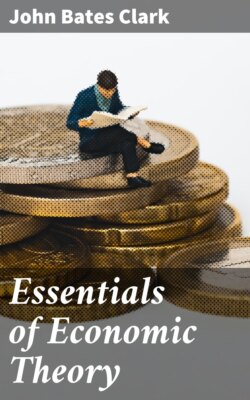Читать книгу Essentials of Economic Theory - John Bates Clark - Страница 11
FOOTNOTES
Оглавление[1] In the economic sense consumption is the utilization rather than the destruction of the thing consumed, though many things go rapidly to destruction in the process. Food is destroyed in the moment of using; clothing perishes more slowly by use, and furniture and dwellings more slowly still. Some things that go gradually to destruction during the process of utilization do not perish the more rapidly because of it. A vase, a statue, or a picture is consumed, in the economic sense, by a person's act of looking at it and getting pleasure from it; but this does not hasten its deterioration except as keeping such an ornament where it can be seen exposes it to deterioration or accident. Climbing a hill to get a view "consumes" the hill in a true sense, and looking from the summit over a wide stretch of picturesque country even consumes—that is, utilizes—the landscape; and certainly this act does not injure the thing utilized. The general fact, however, that goods for final use are, as a rule, injured or destroyed either by the act of consumption or by the exposures that are incidental to it, justifies the use of this term to express the receiving of a service from the usable article. It is a process in which the commodity acts on men's sensibilities and, as a general rule, exhausts itself while so doing. It is worth remembering that this exhaustion of the good is not the essential part of consumption. On the man's side that consists in deriving benefits from the good, while on the side of the good itself it consists in conferring benefit on the man—in doing him good and not in doing itself harm.
[2] We here put out of sight all questions connected with the changing purchasing power of money. This is, in ordinary times, the business man's habit. He considers his capital intact if the number of dollars invested originally in his business still appears on his inventory as representing the net surplus of his assets over his liabilities. If a currency were undergoing rapid inflation, a fixed amount of invested money would represent a shrinking stock of capital goods. This stock would last always, but would grow smaller by a true standard of measurement. All that we are at present interested in knowing is that practical usage treats capital as a permanent fund of productive wealth, and most conveniently describes it as a fixed amount of money "invested" in goods of a productive kind. What is thought of as "money" abides. Of course the practical man does not regard it as actually composed of currency.
[3] Consumers' goods may be regarded in the two distinct ways in which it is necessary to regard capital goods. We may look at particular articles for consumption, as they begin their careers by ministering to their owners' needs, and follow them as they wear out and finally perish. This gives a conception of them which is analogous to the conception of capital goods rather than to that of capital. On the other hand, we may look at the permanent stock of usable articles, which is maintained by the constant coming of new ones to replace those which are worn out, and in this way we get a conception of permanent consumers' wealth. The flow of finished goods from the shops to the users offsetting the concurrent destruction of such articles in the users' hands, has the effect of maintaining a permanent fund of consumers' wealth consisting of perishable goods the identity of which is always changing; and this fund is analogous to permanent capital as we have defined it. Professor C. A. Tuttle has advocated the use of the generic term wealth to denote the two continuing funds which we have here termed, on the one hand, capital, and, on the other hand, the permanent stock of consumers' wealth. We have preferred to use the term wealth in a sense that is generic enough to include both capital and capital goods, and both the permanent stock of consumers' goods and the particular articles that, in turn, compose it. Wealth consists of effectively useful concrete things regarded either as particular articles that can be identified and watched till they perish in the using, or as an abiding stock of articles of this genus, each one of which has in itself only a transient existence. See an article on "The Wealth Concept," by Professor Charles A. Tuttle, in the Annals of the American Academy of Political and Social Science, for April, 1891, and other articles by the same author.
[4] What is commonly termed land contains elements which perish in the using. Such are deposits of coal, ores, or oil, and those ingredients of loam which are exhausted by tillage. Such elements of the soil are not land in the economic sense. How they should be regarded will be shown in a later chapter.
